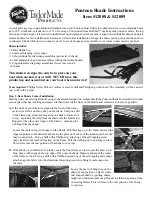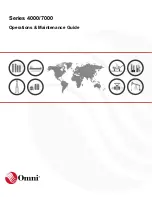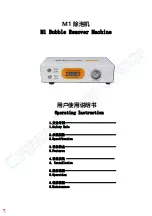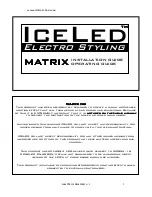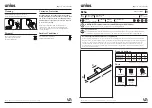
SEITE 9 - 148 x 210 mm - 44000185866/03 - SCHWARZ - 12-410 (sr)
9
ENGLISH
en
Please check the manufacturer’s information about the
cleaning and disinfecting agents.
The light guide must not be exposed to temperatures
higher than 134 °C (273 °F).
The light guide has been tested for up to 500 steriliza-
tion cycles.
Pre-Treatment
The pre-treatment must be carried out before either
automatic or manual cleaning and disinfecting.
왘
Immediately after using (within a maximum of
2 hours), remove gross contaminations from the
light guide.
왘
Rinse the light guide off thoroughly (at least 10 sec.)
under running water or use a suitable disinfectant
solution without any aldehyde (disinfectant should
not contain any aldehyde to prevent blood from
becoming fixed).
왘
Use a soft brush or a soft cloth to manually remove
contaminations. Adhering polymerized composite
should be removed with alcohol, a plastic spatula
may help in removing the material. Do not use any
sharp or pointed tools to protect the surface of the
light guide from scratching.
Manual Cleaning and Disinfection of the Light Guide
왘
Place the light guide for the specified application
time into the solution, making sure that it is
completely covered (as needed, using ultrasonic
support or careful brushing with a soft brush).
A neutral enzymatic cleaning agent is recommended
(e.g., Cidezyme/Enzol from Johnson & Johnson).
왘
Remove the light guide from the solution and rinse
thoroughly (at least 10 sec.) in water with low germ
count.
왘
To disinfect, place the cleaned light guide for the
specified application time into the solution, making
sure that it is completely covered. Disinfectants
containing o-phthalaldehyde are recommended
(e.g., Cidex OPA from Johnson & Johnson).
왘
Remove the light guide from the solution and rinse
thoroughly (at least 10 sec.) in water with low germ
count.
왘
Dry the light guide with a clean cloth.
왘
Check the light guide (see section “Check”).
Automatic Cleaning/Disinfection
(Disinfector /CDD (Cleaning and Disinfection Device))
Alternatively, cleaning and disinfecting can be conducted
automatically. Information about validated procedures
can be obtained from 3M Deutschland GmbH.
Sterilization
Effective cleaning and disinfection are absolutely
essential requirements for effective sterilization.
Only steam sterilization is approved as a sterilization
procedure:
- Maximum sterilization temperature 134 °C (273 °F)
- Sterilization time (exposure time at sterilization
temperature) at least 20 min. at 121°C (250 °F) or
at least 3 min. at 132 °C (270 °F) /134 °C (273 °F)
Check
Before using the light guide again, check it for
damaged surfaces, discoloration, and contamination;
do not use damaged light guides. If the light guide is
still contaminated, repeat the cleaning and disinfection.
Clean Charger, Handpiece, and Glare Shield
Clean all components with a soft cloth and, if
necessary, a mild cleaning agent (e. g. dish-washing
detergent). Solvents or abrasive cleaners may not be
used in any case, as they can damage the plastic
components!
- Cleaning agents must not enter the unit!
To disinfect all components, spray the disinfectant on
a towel and use it to disinfect the unit. Do not spray
the disinfectant directly on the device.
- Disinfectant agents must not enter the unit!
- Dry residual disinfectants on the device with
a soft and fluff-free cloth, as they damage the
plastic components.
If necessary, ask the manufacturer of the disinfectant if
its constant use will damage plastic surfaces.
Clean the protection glass with a soft and fluff-free
cloth. Beware of scratches!
- Make sure that charge contact pins remain dry
and are not contacted by metallic or greasy parts.
Do not bend the charge contact pins during
drying. Wet charge contact pins will cause an
operating error (malfunction message: the LED
showing the operating status in the charger
glows red.
Storage of the Handpiece during Extended Periods
of Non-Use
왘
If the handpiece is not to be used for an extended
period of time - e.g., during vacation - fully charge
the battery prior to departure or keep the handpiece
inserted in the operational charger. A safety switch
within the battery prevents a total discharge.
왘
Discharged or nearly discharged batteries must be
recharged as soon as possible.



























